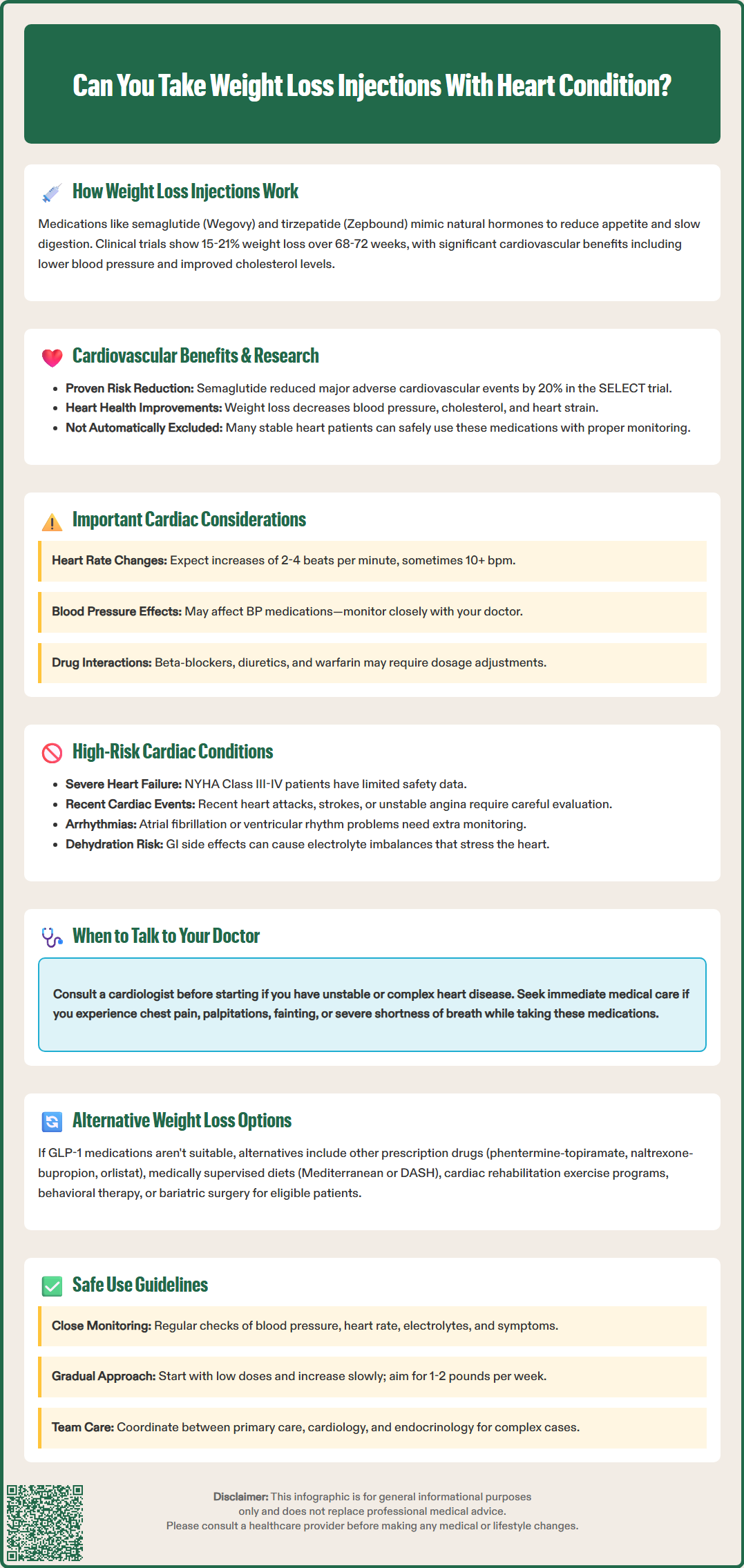LOSE WEIGHT WITH MEDICAL SUPPORT — BUILT FOR MEN
- Your personalised programme is built around medical care, not willpower.
- No generic diets. No guesswork.
- Just science-backed results and expert support.
Find out if you’re eligible

Can you take weight loss injections with heart condition? This question concerns many patients considering GLP-1 receptor agonists like semaglutide (Wegovy) or tirzepatide (Zepbound) for obesity management. For individuals with cardiovascular disease, these medications require careful evaluation of both risks and benefits. Recent clinical trials demonstrate that certain weight loss injections may actually reduce cardiovascular events in specific patient populations, while others with unstable cardiac conditions need individualized assessment. Understanding FDA-approved indications, contraindications, monitoring requirements, and alternative options helps patients and clinicians make informed decisions about safe, effective weight management strategies tailored to cardiac health status.
Quick Answer: Many patients with stable heart conditions can safely use weight loss injections under medical supervision, though those with unstable cardiovascular disease require individualized assessment.
We offer compounded medications and Zepbound®. Compounded medications are prepared by licensed pharmacies and are not FDA-approved. References to Wegovy®, Ozempic®, Rybelsus®, Mounjaro®, or Saxenda®, or other GLP-1 brands, are informational only. Compounded and FDA-approved medications are not interchangeable.
Weight loss injections have transformed obesity management in recent years. These include glucagon-like peptide-1 (GLP-1) receptor agonists such as semaglutide (Wegovy) and liraglutide (Saxenda), as well as tirzepatide (Zepbound), which is a dual glucose-dependent insulinotropic polypeptide (GIP) and GLP-1 receptor agonist. For patients with existing heart conditions, the decision to use these medications requires careful consideration of both potential benefits and risks.
These injectable medications work by mimicking natural hormones that regulate appetite and blood sugar levels. They slow gastric emptying, increase feelings of fullness, and reduce food intake, typically resulting in significant weight reduction over several months. In clinical trials, semaglutide 2.4 mg produced approximately 15% weight loss at 68 weeks, while tirzepatide achieved up to 21% at 72 weeks. The mechanism of action involves binding to receptors in the pancreas, brain, and gastrointestinal tract, which influences insulin secretion and appetite regulation.
For cardiac patients, weight loss itself often provides cardiovascular benefits, including reduced blood pressure, improved lipid profiles, and decreased strain on the heart. Recent cardiovascular outcome trials have demonstrated that some of these medications may actually reduce major adverse cardiovascular events in certain patient populations. The SELECT trial showed that semaglutide 2.4 mg (Wegovy) reduced major adverse cardiovascular events by 20% in patients with established cardiovascular disease without diabetes.
The critical question is not whether these medications can be used with heart conditions, but rather which patients are appropriate candidates and under what circumstances. Individual cardiac history, current medications, disease severity, and specific contraindications all factor into this clinical decision. While not all patients require cardiology co-management, those with unstable or complex cardiovascular disease should consult with a cardiologist before initiating treatment.

Several injectable medications have received FDA approval for chronic weight management. Semaglutide 2.4 mg (Wegovy) and tirzepatide (Zepbound) are approved for adults with obesity (BMI ≥30 kg/m²) or overweight (BMI ≥27 kg/m²) with at least one weight-related comorbidity. Liraglutide 3.0 mg (Saxenda) is also FDA-approved for chronic weight management. It's important to note that Ozempic (semaglutide) and Mounjaro (tirzepatide) are FDA-approved only for type 2 diabetes management, not for weight loss, though they may be prescribed off-label for this purpose.
According to FDA prescribing information, these medications are not contraindicated in most patients with stable heart disease. However, the labels contain important warnings and precautions relevant to cardiac patients. Key considerations include:
Heart rate increases: These medications may increase resting heart rate, typically by 2-4 beats per minute on average, though some patients may experience increases of 10 beats per minute or more
Hypotension risk: Weight loss and volume depletion may affect blood pressure, particularly in patients taking antihypertensive medications
Drug interactions: Delayed gastric emptying may affect absorption of some oral medications; tirzepatide specifically may decrease exposure to oral contraceptives during dose initiation and escalation
The Wegovy prescribing information was updated in 2024 to include data from the SELECT trial, which demonstrated cardiovascular risk reduction in patients with established cardiovascular disease. For patients with unstable cardiac conditions, a careful risk-benefit assessment is recommended. These medications should be part of a comprehensive weight management program including dietary modification and increased physical activity, with treatment plans individualized based on patient response and tolerability.
While weight loss injections show promise for many patients, certain cardiac conditions warrant particular caution. Understanding these risks enables informed decision-making between patients and their healthcare teams.
Specific cardiac considerations include:
Heart rhythm concerns: The heart rate-increasing effect may require additional monitoring in patients with atrial fibrillation, supraventricular tachycardia, or ventricular arrhythmias
Heart failure: Patients with New York Heart Association (NYHA) Class III-IV heart failure were excluded from major clinical trials, and there is limited safety data in this population
Recent cardiac events: Patients with recent myocardial infarction, stroke, or unstable angina may require individualized assessment during the recovery period
Hemodynamic considerations: Rapid weight loss may affect fluid balance in patients with significant cardiac disease
Adverse effects relevant to cardiac patients include gastrointestinal symptoms (nausea, vomiting, diarrhea) that may lead to dehydration and electrolyte disturbances. Hypoglycemia risk increases primarily when these medications are combined with insulin or sulfonylureas, which may cause sympathetic activation and cardiac stress.
Patients taking medications for heart conditions require careful monitoring. Beta-blockers may mask tachycardia symptoms, while diuretics combined with volume loss may cause excessive hypotension. For patients on warfarin, INR monitoring may be appropriate based on clinical judgment.
Absolute contraindications include personal or family history of medullary thyroid carcinoma, multiple endocrine neoplasia syndrome type 2, and pregnancy. Additional warnings include risk of pancreatitis, gallbladder disease, and diabetic retinopathy complications (with semaglutide). Patients should immediately report chest pain, palpitations, syncope, or severe shortness of breath during treatment, as these may indicate serious complications requiring urgent evaluation.
For cardiac patients who are not suitable candidates for GLP-1 receptor agonist or dual GIP/GLP-1 receptor agonist therapy, several alternative weight management strategies exist. The optimal approach depends on individual cardiac status, weight loss goals, and overall health profile.
Alternative pharmacological options include phentermine-topiramate (Qsymia) and naltrexone-bupropion (Contrave), though these also carry cardiac considerations. Phentermine-topiramate may increase heart rate and blood pressure, making it contraindicated in uncontrolled hypertension and certain cardiovascular conditions. It also carries teratogenic risk. Naltrexone-bupropion can increase blood pressure and heart rate, is contraindicated in uncontrolled hypertension and during opioid use, and carries a boxed warning for suicidality risk. Orlistat (Xenical, Alli), a lipase inhibitor that reduces fat absorption, has a more favorable cardiac safety profile but causes gastrointestinal side effects and provides modest weight loss (3-5%).
Non-pharmacological approaches remain foundational for cardiac patients:
Medically supervised dietary programs: Structured meal plans with registered dietitian support, emphasizing heart-healthy Mediterranean or DASH dietary patterns
Cardiac rehabilitation programs: Supervised exercise training tailored to individual cardiac capacity and limitations
Behavioral therapy: Cognitive-behavioral interventions addressing eating patterns, stress management, and lifestyle modification
Bariatric surgery: For patients with BMI ≥35 kg/m² with obesity-related comorbidities or BMI ≥40 kg/m² (per NIH 1991 criteria; ASMBS/IFSO 2022 guidelines suggest expanded indications), metabolic surgery offers substantial weight loss with cardiovascular benefits. Insurance coverage criteria vary.
Patients with heart conditions who receive approval for weight loss injections require appropriate medical supervision. Monitoring considerations include:
Blood pressure and heart rate monitoring, with potential adjustment of antihypertensive medications
Assessment of electrolytes in patients at risk (those taking diuretics or with significant gastrointestinal symptoms)
Targeted cardiovascular assessment based on symptoms and risk factors
Gradual dose titration to minimize adverse effects and allow cardiovascular adaptation
Many patients with stable heart disease can safely use GLP-1 receptor agonists under medical supervision. The SELECT trial demonstrated that semaglutide 2.4 mg reduced major adverse cardiovascular events by 20% in patients with established cardiovascular disease, though those with unstable conditions require individualized assessment.
While not absolute contraindications, NYHA Class III-IV heart failure, recent myocardial infarction, unstable angina, and uncontrolled arrhythmias warrant particular caution. Patients with these conditions should undergo careful risk-benefit assessment and may require cardiology consultation before starting treatment.
GLP-1 receptor agonists typically increase resting heart rate by 2-4 beats per minute on average, though some patients experience increases of 10 beats per minute or more. They may also affect blood pressure through weight loss and volume depletion, particularly in patients taking antihypertensive medications who may require dose adjustments.
All medical content on this blog is created using reputable, evidence-based sources and is regularly reviewed for accuracy and relevance. While we strive to keep our content current with the latest research and clinical guidelines, it is intended for general informational purposes only.
This content is not a substitute for professional medical advice, diagnosis, or treatment. Always consult a licensed healthcare provider with any medical questions or concerns. Use of this information is at your own risk, and we are not liable for any outcomes resulting from its use.